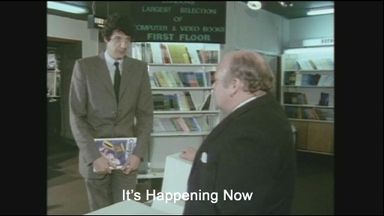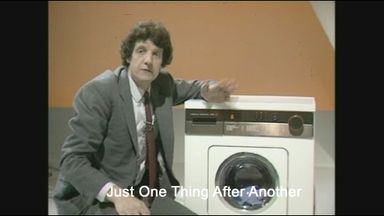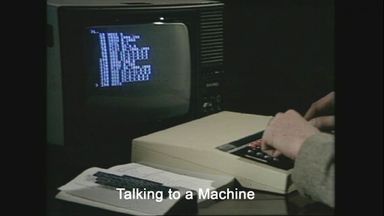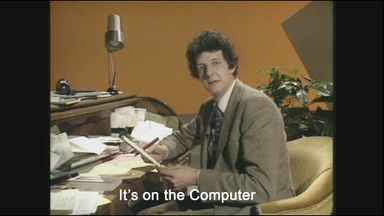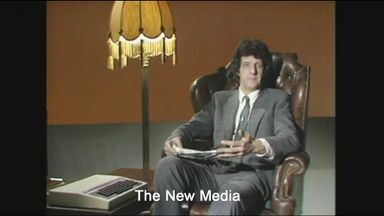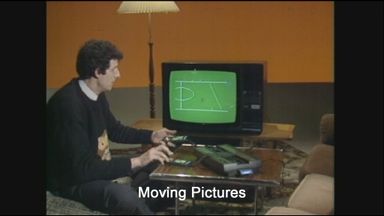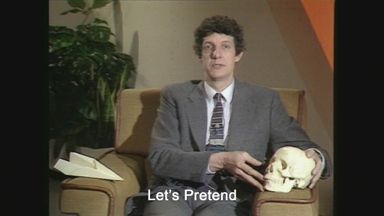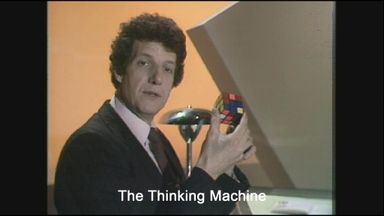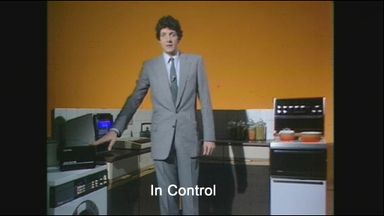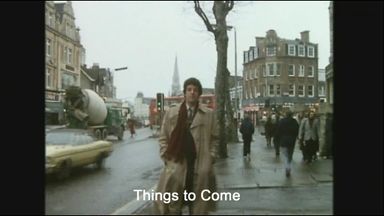The Computer Programme
3. Talking to a Machine
Clips from this programme
Chris Serle reminds us that when programming a computer we are 'talking to a machine' but in a specific language
Duration: 00:40A fairground organ depends on metal prongs going through punched holes in a concertina-like program of cards to play its notes. A binary system running a program to do just one thing - play music. A computer is a multipurpose machine
Duration: 03:34An early Ferranti binary computer uses simple plugs and sockets to hold a program to play music. In earlier times it controlled an ammonia plant.
Duration: 02:40Mac explains the processes going on inside a computer even if it seems to be doing nothing. For example checking to see if a key has been pressed. Constant repetition of a loop. Changing of the guard is used as an analogy. This is all part of its operating system.
Duration: 03:55One programming technique involves using groups of commands or 'subroutines' which carry out a complex often needed activity. This is likened to a refrain in music
Duration: 01:48An exploration of the various different computer languages available. Some - like BASIC - easy to learn but easier to make mistakes and there are many forms of BASIC. PASCAL is a more rigorous language. BASIC (Beginners All-purpose Symbolic Instruction Code) is the language chosen for much of this Project.
Duration: 01:43Gill Neville looks at a computer controlled lathe programmed to make a complex part and discusses the various procedures it uses to operate.
Duration: 02:46Mac and Chris Serle discuss procedural programming techniques to control a small industrial robot arm using BASIC on the BBC Micro. The term 'interpreter' is explained.
Duration: 06:03Credits sequence over a shot of the robot feeding fish in a tank
Duration: 00:46The Computer Programme
1. It's Happening Now
First broadcast: 11th January 1982
Duration 24:51
"Don't expect the computer revolution to happen tomorrow, it's going on all around us." Chris Serle, Ian McNaught-Davis and Gill Nevill begin their exploration of the world of Information Science and ask: 'What can computers do for us? Who is using them now, and where is this technology likely to lead?' Director: FRANK ASH Director: MATT BONEY Producer: PAUL KRIWACZEK
2. Just One Thing After Another
First broadcast: 18th January 1982
Duration 24:53
CHRIS SERLE, IAN MCNAUGHT-DAVIS and Gill Nevill, continue their exploration of the world of information science. Even the most elaborate and sophisticated computer programs are made up of only a few types of relatively simple steps. The art of computer programming lies in combining these into ever more complex combinations. Directors FRANK ASH, MATT BONEY Producer PAUL KRIWACZEK
3. Talking to a Machine
First broadcast: 25th January 1982
Duration 24:23
CHRIS SERLE, IAN MCNAUGHT-DAVIS and GILL NEVILL continue their exploration of the world of information science. The difficulty of communicating with computers is that they are machines and we are people. The common language we share can turn out to be a lot more like English than we might expect. Directors FRANK ASH, MATT BONEY Producer PAUL KRIWACZEK
Now playing
4. It's on the Computer
First broadcast: 1st February 1982
Duration 24:39
CHRIS SERLE, IAN MCNAUGHT-DAVIS and GILL NEVILL continue their exploration of the world of information science. Storing information is what the great majority of computers are used for. But how much can they hold, and how can the stored information be easily retrieved? Director MATT BONEY Producer PAUL KRIWACZEK
5. The New Media
First broadcast: 8th February 1982
Duration 24:12
CHRIS SERLE, IAN MCNAUGHT-DAVIS and GILL NEVILL continue their exploration of the world of Information Science. 5: The New Media : The greatest public impact of information technology is likely to be in the provision of new means of communication. Directors FRANK ASH, MATT BONET Producer PAUL KRIWACZEK
6. Moving Pictures
First broadcast: 15th February 1982
Duration 24:37
CHRIS SERLE, IAN MCNAUGHT-DAVIS and GILL NEVILL continue their exploration of the world of information science. For many people games, with their elaborate visual displays, are the most commonly encountered aspect of computer technology. But generating sound and pictures from a computer is no different to manipulating text. Director: MATT BONEY Director: Frank Ash Producer: PAUL KRIWACZEK
7. Let's Pretend
First broadcast: 22nd February 1982
Duration 24:32
CHRIS SERLE, IAN MCNAUGHT-DAVIS and GILL NEVILL continue their exploration of the world of information science. 7: Let's Pretend: Training space-shuttle pilots, or testing bridges to destruction, is normally too costly or too dangerous to do on the real thing. But by giving a computer an exact description of how a complicated system behaves, it can mimic anything from the British economy to the world's weather. Directors FRANK ASH, MATT BONEY Producer PAUL KRIWACZEK
8. The Thinking Machine
First broadcast: 1st March 1982
Duration 24:30
CHRIS SERLE, IAN MCNAUGHT-DAVIS and GILL NEVILL continue their exploration of the world of information science 8: The Thinking Machine: In spite of years of investment in the development of intelligent machines, computer scientists are still a long way from equalling human thought, let alone surpassing it. The future, however, may yet present us with great surprises. Directors MATT BONEY, FRANK ASH Producer PAUL KRIWACZEK
9. In Control
First broadcast: 8th March 1982
Duration 24:34
CHRIS SERLE, IAN MCNAUGHT-DAVIS, GILL NEVILL 9: In Control: By far the greatest number of computers with which we will come into contact in the future will be invisible. They will be the microprocessors built into many of our domestic appliances, replacing many of the mechanical systems that we use today, with greatly improved reliability, flexibility, and at low cost. Directors FRANK ASH, MATT BONEY Producer PAUL KRIWACZEK
10. Things to Come
First broadcast: 15th March 1982
Duration 24:17
CHRIS SERLE, IAN MCNAUGHT-DAVIS and GILL NEVILL continue their exploration of the world of information science. Things to Come: Information technology has the power to change the face of our society completely by taking over the work of a large majority of the population. But will this be allowed to happen, and which aspects of our economic life are most likely to be affected? Directors MATT BONEY, FRANK ASH Producer PAUL KRIWACZEK










